Animal Care Center of Shorewood

FAQ
What forms of payment do you accept?
We accept cash, Scratchpay, Visa, Mastercard, Amex, Discover and CareCredit. We do not allow payment plans. All services must be paid for at the time they are rendered. We accept all pet insurance plans, which are paid out as reimbursements.
How do I schedule an appointment?
If you have questions on what qualifies as an appointment, please call the hospital at (815) 744-1500.
Appointments are required for all services (appointments, surgery, boarding, grooming, and doggie daycare).
How do I know if my pet is having an emergency?
We’ve prepared a list of emergency situations to help you better understand what may require a visit to our animal hospital. Review the emergency situations here.
How long can I expect to wait before my pet is seen?
All staff scheduling is based on typical daily patient load to ensure expediency, and we do our best to get clients in and out as quickly as possible. Please note that critical patients take precedent over wellness visits.
Can I visit my pet in the hospital?
If your pet requires an extended hospital stay, our doctors would be able to discuss scheduling a visit. Family visits keep pet spirits up while lessening fears or insecurities your pet may be feeling while away from home. We believe visits from loved ones actually speed up the recovery process!
How do I prepare my pet for surgery?
If your pet is coming in for a routine scheduled surgery, a 12-hour fast prior to the appointment is typically required. Plan on arriving early that morning for routine blood work and any other necessary diagnostics. When you arrive, a technician will go over the pre-surgical authorization form while also covering important electives for your pet’s comfort and health which will require your approval. This is an ideal time to ask any questions you may have about the procedure and/or recovery. You will also receive thorough discharge instructions regarding post-op medications, what to expect from your pet, and when to return to the clinic for a recheck.
What are common effects of anesthesia?
While some pets are sleepy for the remainder of the day following anesthesia, today’s anesthetic methods are more advanced and allow pets to return to their normal demeanor much quicker than in the past. To avoid stomach upset, we recommend only small amounts of water and little to no food until the morning after surgery.
What are the protocols for post-surgical care?
Your pet should rest for the remainder of the day following surgery. Depending on the type of surgery, cage rest may be recommended for continued days. If your pet is sent home with prescriptions, please finish all medication to ensure that he remains pain- and infection-free.
Is there anything specific I should watch for following my pet’s surgery?
Monitor your pet throughout the day to make sure he is not licking or chewing at their wound or bandages. This can cause permanent tissue damage or infection and may require a repeat procedure if either the sutures or wound site is damaged.
Do you board pets?
We board dogs and cats, including those with medical conditions requiring additional care, in our spacious indoor runs or large cages. We do require reservations for your pet’s stay. Call for current boarding rates and to schedule other services, such as bath and grooming before the return home. All boarding pets must be current on required vaccines and stool checks before staying with us. Your regular vet can even email them to us ahead of time.
Do you offer grooming services?
We groom dogs five days a week. Grooming appointments are required. All grooming dogs must be current on required vaccines and stool checks prior to their visit.
What vaccines will my puppy need?
Puppies require a series of several vaccines to protect them from fatal and contagious diseases and viruses. We recommend rabies, distemper, canine influenza, bordetella (for upper respiratory infection), and lyme. They will also receive several dewormings and stool checks to protect them from intestinal parasites.
What vaccines will my kitten receive?
Kittens require a series of several vaccines to protect them from fatal and contagious diseases and viruses. We recommend rabies, distemper, and feline leukemia / FIV test. They will also receive several de-wormings and stool checks to protect them from intestinal parasites.
What about boosters?
We recommend annual boosters of all vaccines for both dogs and cats. Studies show that boosters offer additional protection from diseases and viruses by preventing vaccines from losing their effectiveness over time.
What is heartworm and how do I protect my pet from it?
Heartworm is a deadly disease that pets can get from infected mosquitos. Because pets are vulnerable to mosquitos for 75% of the year, we recommend year-round heartworm prevention for all pets.
